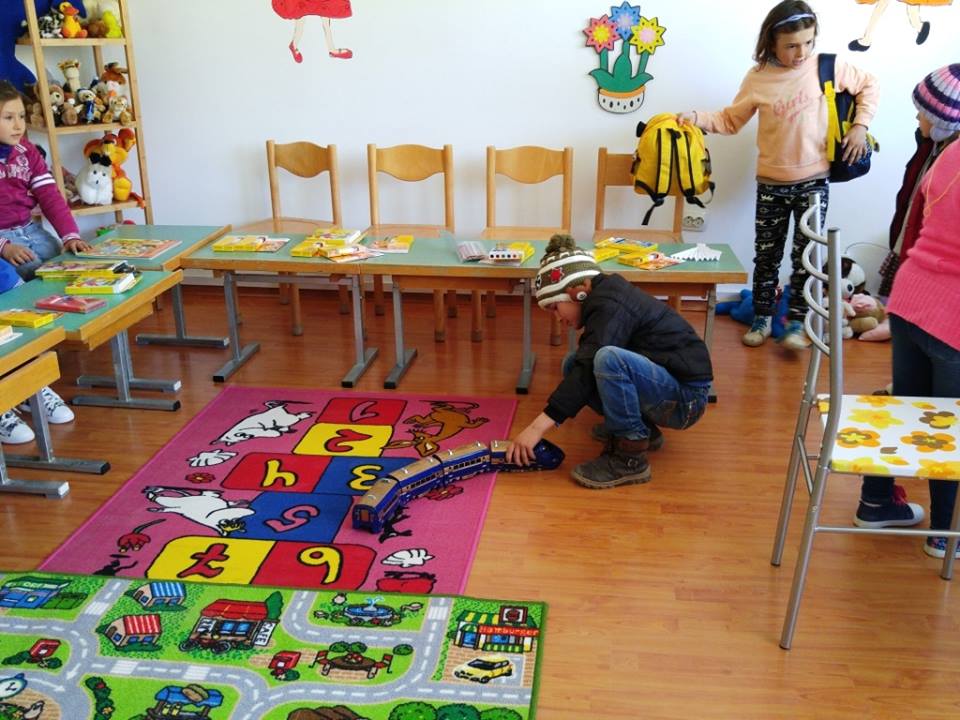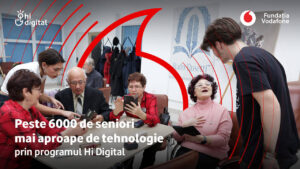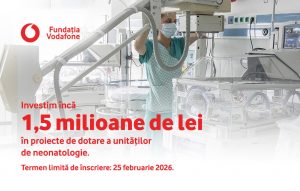“If a child is able to hold a bucket, he/she will carry water each day”, says Gabriela Achihai, the president of the Community Support Foundation (FSC) from Bacău. From a very young age, children in poor rural communities take the cows on the pastures, feed the livestock, chop wood and kindle the fire. The girls cook, wash, clean, raise their younger brothers. They work hard all day long and at the end of this hard work, there’s a big wall closing in on their future.
The foundation members try to convince the parents to allow them to go to school, send a pediatrician to their yard, explain to the adults that they should give less chores to their young ones and stop giving them alcohol. “There are these conceptions: A child sleeps better if given plum brandy. A child craves for alcohol and should get some. There were cases where the doctor came to vaccinate them and the children ran out the window, because they had been drinking and they knew at least that medication should not be mixed with alcohol”, says Gabriela Achihai about just one of the issues threatening the development of children in the rural area.
Another issue is related to the fact that parents can’t see why their children should waste their time studying, when there’s so much to do around the house, and anyway, school is “useless”.
“They ask why should children go to school, since they won’t be able to find jobs anyway and will return to live home. Or say that they will go abroad and you don’t need to be educated for that. They claim that in Romania not even an educated person can find a job. And we try to explain to them that if a child is educated or has a qualification, he or she can find a job much easier. We even had a project for adult training and we told them that: If you had more education, took some classes, you could have become something else”, recalls the FSC President.
The change of a village where, 10 years ago, only one child made it to high school
And yet, in time, some things changed. Ten years ago, in one of the most challenged villages of Bacău County, Slobozia Noua, only one child managed to get into high school. “Now, through the programs and scholarships provided by the Foundation, between 18 and 20 children move on to high school each year”, she estimates. One girl from Vultureni who received support and got an education recently returned to the commune as a teacher.
In the poor areas of Bacău, FSC has founded eight “Cluburi cu lipici”(Clubs that ‘stick’), daycare educational centers where children receive a snack, do their homework and are involved in afterschool activities.

All this, with the help of several people from the local community, selected and trained through training courses. The children sing, paint, learn basic notions on money management, talk to an adult about how life in a high school would be like for them and the challenges they would face. “We focus a lot on life skills. Among others, we tell them that in high school, they might encounter children who will make fun of them and we discuss ways to handle this. We talk to the parents, we provide scholarships, we find sponsors to support some of the costs involved by going to high school. We find mentors for them, high school students from the city who volunteer and whom they meet during summer school programs”, says Gabriela Achihai.

Unfortunately, the educational system in the rural area, with commuting substitute teachers who teach several subjects, affects the children from the vulnerable categories. This is why sometimes they reach middle school without even being able to read. In their case, learning to write becomes a performance, while high school is out of the question.
90% of the children in a commune have tooth cavities, 50% have bone problems
Another component of the FSC programs is medical care. The Foundation brings pediatricians to the rural areas, in order to assess the children’s health condition and teach the mothers how to take care of the children and feedthem. An assessment performed in one of the communes revealed that 90% of the children had tooth cavities and half of them had bone problems, most likely caused by household chores, their inadequate position at the desk and sleeping on improvised surfaces. The doctors also found children with eye, heart and liver problems that their parents knew nothing about. Some of them will require additional investigations and treatment in the city.
The helplessness of the elders in the rural environment
Gabriela Achihai began working in the field of social assistance in 1992, as a translator for the British nurses and doctors from the Relief Fund for Romania, who came to help rural Romania. She became a multitasking specialist: she ran the caravan that hosted the mobile medical practice, she tried to find out what the people needed, she translated. After the British left, in 1995, she continued the project with Romanian doctors and nurses, and in 1997, she founded the Community Support Foundation. The foundation’s projects are currently supported by the Vodafone Romania Foundation.
“Working in the rural area, I witnessed the helplessness of the elders. Even if a doctor came and gave them a prescription, they couldn’t get the medication. So I turned a minibus into a pharmacy. I negotiated with the pharmacies the opening of village work points. I created a home care program for the elders. In 1997, I worked on the occupational standard for the profession of caretaker. We began providing qualification to women in communes, women who hadn’t worked a day in their life as caretakers. We gave them employment records, their social status changed – they began to provide a social service in the community”, says Gabriela Achihai.
The beginnings: volunteer in the orphanages of horror
In the 90’s, under the guidance of British specialists, she started doing therapy through games and art with the children in the orphanages of horror. The children were in terrible shape, they were bedbound, they were fed like animals, washed with a hose and received no sign of affection. When the volunteers asked that the caretakers dress them up and take them out, they replied that it would be pointless. “We would tell them: These children have souls. Look, if you work with him, and he smiles, this is a result of your work. It wasn’t enough for our team to go help these children without acting at the level of the employees”, she believes. Meanwhile, we held classes with the people working in orphanages, including the caretakers, we certified the course”, says Gabriela Achihai.
Now, the FSC volunteers also include 200 high school students from Bacău County, who attend, at the beginning of the program, leadership, communication and project management classes. They provide support for the children in the centers of the Directorate for Social Assistance and Child Protection and to children from poor families, help the patients hospitalized at the neurology hospital in Bacău and the elders who have remained alone, they raise awareness and organize fundraising campaigns. “They are extraordinary and, through what they do, they have stood out from the crowds. Think about it, in Bacău, there are 12,000 high school students. Some of the volunteers are currently our employees”, says the FSC President.




